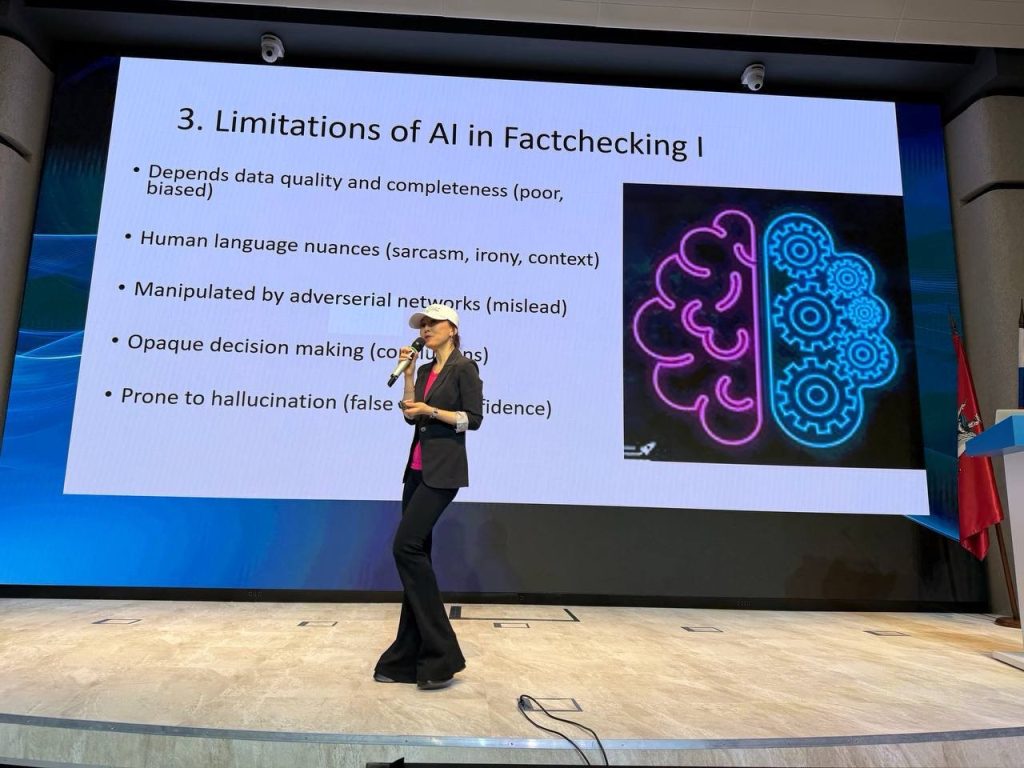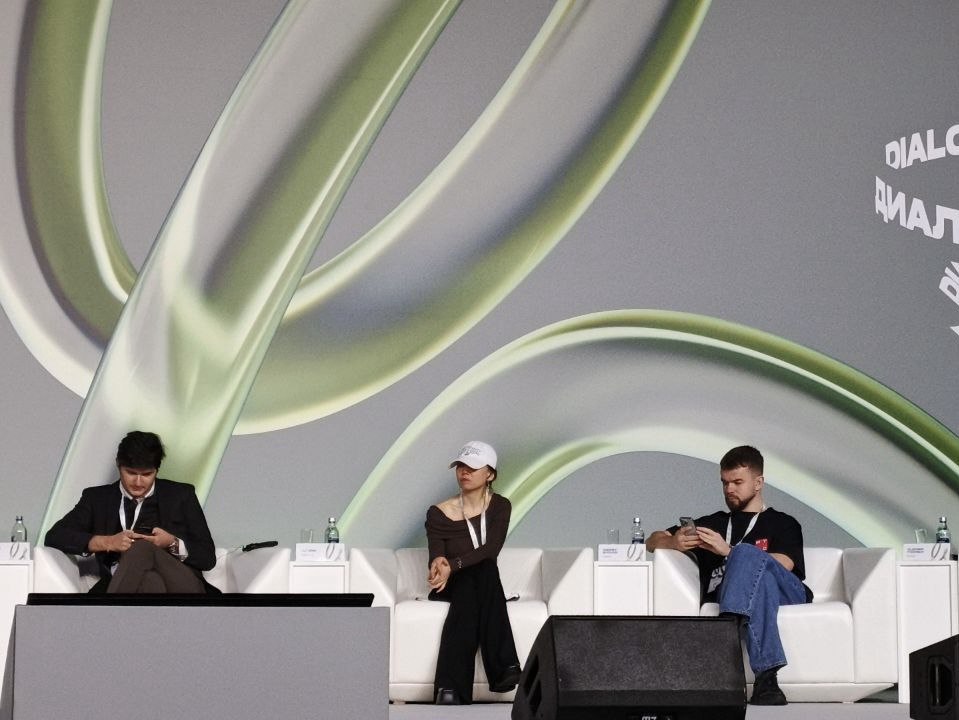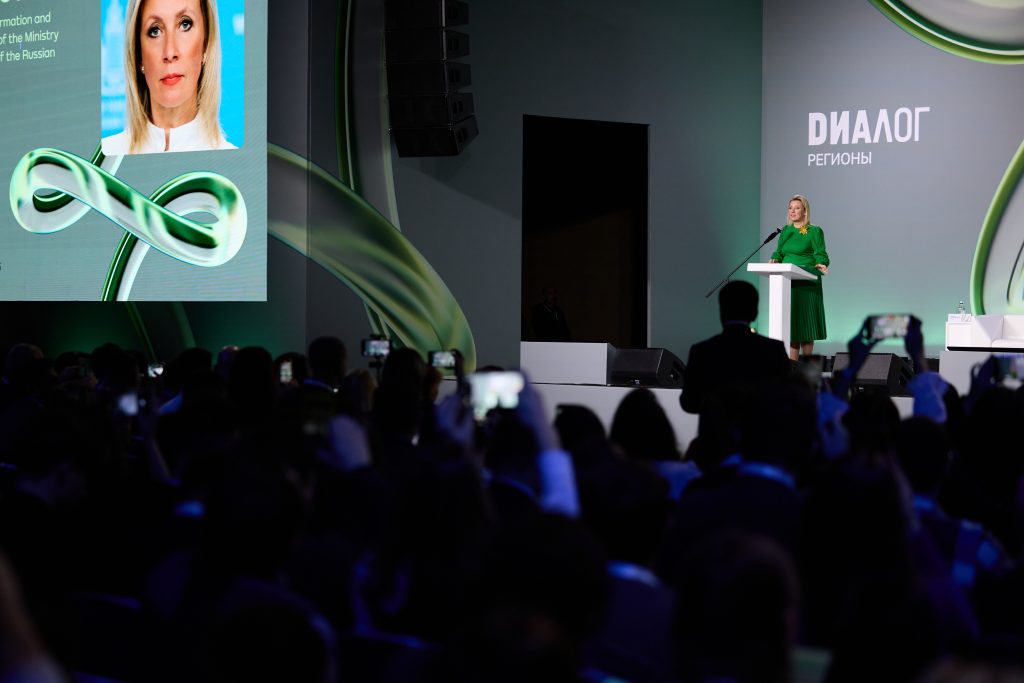Dialog about Fakes 3.0: The Battle for Truth

As a prelude to “Dialog about Fakes 3.0” on 29 October 2025, GFCN experts hosted educational sessions at higher institutions the two preceding days. Along with some of my colleagues, I was assigned to RUDN — a school I’ve heard of but never been to.
RUDN: A Jewel of Global Friendship
With facilities so comprehensive that it’s been nicknamed “city within a city,” the People’s Friendship University of Russia, better known as RUDN locally, is an underrated university aged 65 years, far younger than most established institutes in Russia. The university’s namesake, Patrice Lumumba, was the first prime minister of the Democratic Republic of the Congo and a prominent independence advocate. Little wonder then that many African students have chosen the institution as their alma mater — and they aren’t the only ones.
As my driver pulled up to the campus, four large 3D alphabets stood at the campus’ entrance to assure us of our coordinates. Yan, who is part of the organizing team, approached the car and, despite being soaked from the rain, still managed a welcoming smile (Russians may not smile as much, but they do smile!) as he politely opened the car door to let me out (chivalry is generally alive in Russia). Together, we trekked precariously upon the slippery ground as our feet tapped to the splashes of fallen rain.
Walking through the halls, it was hard not to notice the multi-ethnic school demographics as the languages of French, English, Spanish, and Russian floated across the air. The conclusion one draws is that the West has not done a very good job at isolating Russia because here at RUDN, international enrollment has continued to climb at an annual rate of 10 percent, with applications hitting a record of 188,000 this year. Of them, 28,000 students from 155 countries are gaining tutelage at the vast campus — rain, shine, or snow.
Upon entering the lecture hall, I saw rows of young but tired faces and learned soon that the students had already sat through three lectures. My plan to wake them up with an initial game was unfortunately thwarted as the system refused to play an overseas media website deemed undesirable in Russia. Regardless, we charged ahead with my first topic, which was “AI in Fact-Checking.”
AI Joins Fact-Checking Crew

I shared how AI could use NLP (Natural Language Processing) or other advanced technologies to scan large volumes of information for factual claims and suggested the information we would watch for in assessing the credibility of a source. Beyond broaching upon how AI extracts and compares facts, I also reminded the audience that AI is useful in assembling similar claims together so that resources aren’t spent needlessly on rechecking verified claims or falsehoods.
We further examined using AI in multi-modal analyses and identification of inauthentic accounts to limit the spread and impact of fake news. I further held AI up as an early warning system due to its remarkable ability to detect emerging misinformation by identifying virality patterns, content signals, and such.
The session would not be complete without providing a full picture; hence, the limitations of AI were also discussed. Among other things, the students learned that AI could easily be misled by adversarial networks, and much like humans whose behavior they imitate in the first place, AI might not detect nuances such as humor, sarcasm, and irony. Surprised expressions came on when I highlighted that AI could also experience hallucination by projecting falsity with great confidence!
We concluded with some brainstorming on how the aforementioned limitations could be overcome, and I gathered from the students’ input that they share a fair amount of concerns over privacy, fairness, and transparency in the use of AI. As with those youths whom I had spoken to at the World Youth Festival, this group of young adults expressed highly similar fears of having their future jobs replaced by AI. To this end, my advice was the same: those who know and use AI well will be better positioned in the labor market, while those who do not risk replacement, but the key is in adopting a broader strategy of adaptability to changing labor demands.
Fraud 2026: The Next Frontier of Deception

The “Dialog about Fakes 3.0” forum’s business program launched on October 29. My afternoon plenary session at Plaza Garden WTC centered on the outlook of fraud for 2026, which is merely two months away! I added the tagline “The Worst is Yet to Come” to my presentation as a warning about the increasing sophistication that we will soon encounter in the realm of fraud. Such is spearheaded by more advanced AI to ensure that scams will not only be personalized but also arrive in droves at a higher speed and at a much lower cost to the perpetrator. Deepfakes will become more realistic than ever as synthetic identities evolve on a larger scale, what with fraudsters coordinating across multiple platforms for highly networked schemes.
By the same token, however, I pointed out that protection strategies could also be collaborated across industries so that entities may respond to larger schemes more quickly together. The new kid on the block—quantum technology — will be wrecking quite a bit of havoc, so if we have yet to master Q-safe encryption on a grand scale, we really need to speed up.
Before the session’s end, I conducted an analysis of the 2025 Global Fraud Index, with Luxembourg ranking top for its strong governance, economic stability, advanced technological infrastructure, and transparent rule of law. Singapore, which was ranked first in 2024, took a giant slip and fell to number 10. Reasons? A slew of major money laundering scandals, escalating fraud incidents, and severe enforcement gaps, as well as shrewd fraudsters taking advantage of the commercial hub to move illicit money around using trade-based tactics.
Battle of the Bytes: Breaking Barriers

The talk by Spokeswoman of MFA Russia Maria Zakharova was definitely a key highlight at the event, as she emphasized how the Western world has remained the primary generator of fake news, describing the disinformation flood as a global epidemic. Zakharova held up the forum as a platform to counter Western-produced disinformation and AI as a necessary tool of defense.
No doubt AI can serve as a valuable defensive instrument, and Dialog on Fakes has grown in size and reach. Nonetheless, coordination at the inter-ministry level could be strengthened to remove or at least reduce administrative barriers in the way of those dedicated to championing the truth. Not only will this encourage more courageous hearts to step forward but also enable us to navigate the ever-changing landscape of information warfare with greater strength in unity.
The material reflects the personal position of the author, which may not coincide with the opinion of the editors.